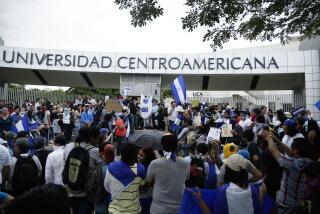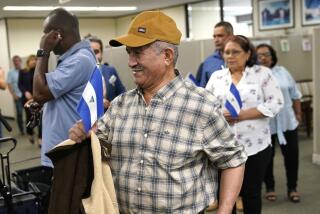Nicaraguan Rebels Agree to Reforms : Contra Leaders Accept Reforms Pressed by U.S.
- Share via
MIAMI — Nicaraguan rebel leaders, under pressure from the Reagan Administration to unify their troubled movement, have agreed to reforms that give greater power to moderates in their struggle to overthrow the leftist Sandinista government, rebel officials said today.
After 2 1/2 weeks of tense, closed-door negotiations, the three civilian leaders of the rebel umbrella group United Nicaraguan Opposition told a news conference that they have resolved many of their differences and reached a power-sharing accord.
“There has been no victor here. If anyone has come out as a victor, it’s UNO,” said Arturo Cruz, one of three directors of the umbrella organization that was formed 11 months ago.
More Civilian Control
The changes in the Administration-backed rebel coalition appear to place guerrilla forces under stricter civilian control while boosting the standing of two moderate leaders who had recently threatened to resign, officials said.
The reforms--including the naming of a financial watchdog and a special inspector to monitor combat operations--come at a time when the rebel group is beset by congressional allegations of corruption, human rights abuses and misuse of U.S. funds.
The Miami summit of UNO directors--a showdown between conservative Adolfo Calero, a former official of the Somoza regime, and moderates Cruz and Alfonso Robelo, both former Sandinistas who broke with the new government after it came to power in 1979--was called at the behest of the Reagan Administration, which had told the rebels to settle their power disputes.
Threat of Disunity
Administration officials have expressed fears that disunity within the ranks of the insurgents, known as contras, could jeopardize congressional approval of President Reagan’s request for $100 million in new aid.
“We have achieved the strengthening of UNO,” Robelo told reporters. “We have eliminated certain difficulties that existed.”
The key reform centers on the division of power among the three civilian leaders, rebel officials said.
More to Read
Sign up for Essential California
The most important California stories and recommendations in your inbox every morning.
You may occasionally receive promotional content from the Los Angeles Times.













